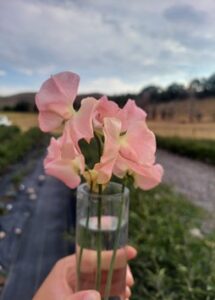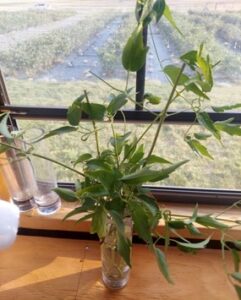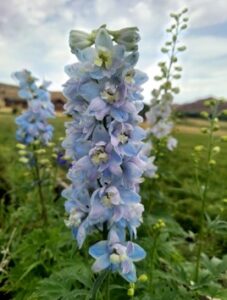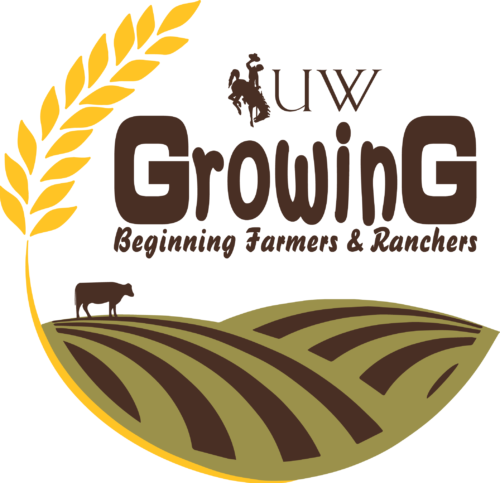Different Kinds of Seasons
#bfrdpwy #aginternship #RightRisk
This week has been fairly uneventful since it is the end of the season. Next week is also my last week at my host site, which is hard to believe! I think about the beginning of the summer when my days were full of hustling back and forth between the cooler and the field, cutting peony blooms. It feels so long ago! But the end of the season has lessons to learn as well amidst the weeding (one constant is weeds never quit!). The world experiences four seasons, and agriculture follows the same pattern.

While peony season has been over for a while, many other flowers are just starting to bloom. Last week we trellised the sweet peas, and they have doubled in size! Since these are vining plants, having a trellis allows them to grow upward and have a longer stem. We also have a random bed of delphinium that has been blooming, as well as many roses, and the zinnias and dahlias we planted at the beginning of the season. It has been fun seeing other flowers bloom and grow. My site host encouraged me to cut some and see how they opened in the vase, so I cut some sweet peas and delphinium. Every flower has different requirements for being cut. Some flowers will stop opening once cut, which I observed with delphinium, so it’s best to cut them when almost all of their flowers are open. This is different from peonies which are cut when they are still in bud form. When you cut flowers also depends on how you plan to use them. If you are selling bouquets in a market, you want the flowers to last a long time in the vase. For these flowers, you pick flowers with a long vase life and cut them before they are fully open. For events, such as weddings, flowers are expected to last for only a day, so flowers can be cut when they are fully blown open.

My host and I have also been experimenting with increasing the use of native plants in her operation. We discovered a native vine that’s all over the property, usually growing on top of fences and other plants. We found out that it’s called Western White Clematis, also known as old man’s beard (which I thought was a funny name for it). We are trying to root it in water right now to see if we can establish it on the farm. The idea is to have a vining plant that could provide wind and water protection to some of the buildings on my host’s property, as well as have a low-maintenance foliage plant to cut from. Since they are a vine, they should root pretty easily just by being cut from where it connects to the main branch and being placed in water, so we will see if any roots develop in the next week!
This slower part of the season is also a great time to start planning for the next one. My host has been slowly planting other flower varieties en masse to use in her peony bunches, such as foxtail lilies and iris. Since these varieties do well in the Wyoming climate and have a similar bloom time to peonies, she purchased more to plant as a crop next year. She also showed me her layout for a bulb garden next year, using poster board and cut-out pictures from a bulb magazine, which will be used more for aesthetics than cutting. She has also been going through this year’s finances and sending out invoices, which she will show me next week, so I have an idea of how to manage an operation’s banking.

It makes me sad to think that next week is my last week. My site host told me to think about the remaining questions about flower farming I have and to send her a list of the resources that I want. So far, I think knowing the apps and resources she uses to maintain her business and purchase seeds and flowers wholesale would be useful. These resources will give me practical steppingstones so I can start my operation when I am ready.
Some questions I can think of include more of the business side of things, such as what a flower farmer realistically makes in a year, the yearly costs, how she stays organized, etc. She also mentioned she would show me how she does her invoices. To be completely honest, I don’t know what invoices are! So obviously, there is still a lot to learn. Good thing I have a week left!
Submitted by: Emzie Coop
Edits by: GrowinG Internship Team

